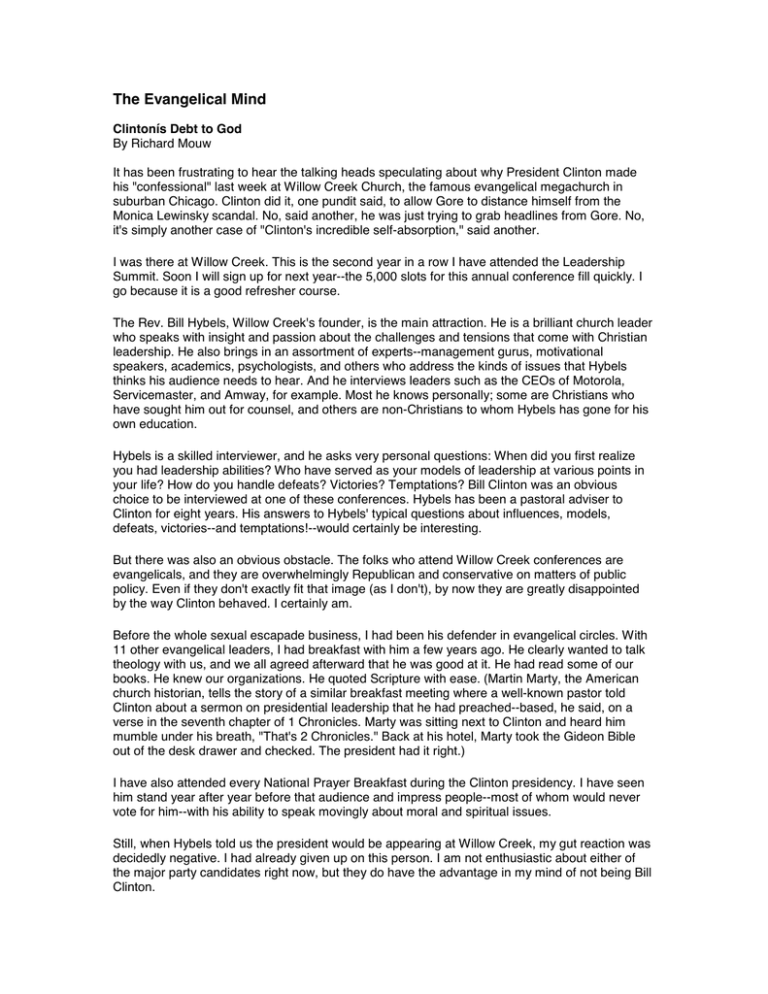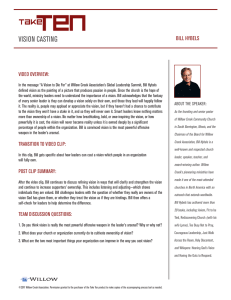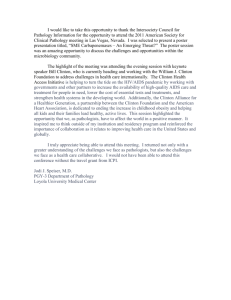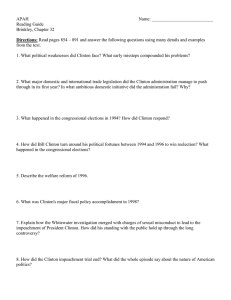The Evangelical Mind
advertisement

The Evangelical Mind Clintonís Debt to God By Richard Mouw It has been frustrating to hear the talking heads speculating about why President Clinton made his "confessional" last week at Willow Creek Church, the famous evangelical megachurch in suburban Chicago. Clinton did it, one pundit said, to allow Gore to distance himself from the Monica Lewinsky scandal. No, said another, he was just trying to grab headlines from Gore. No, it's simply another case of "Clinton's incredible self-absorption," said another. I was there at Willow Creek. This is the second year in a row I have attended the Leadership Summit. Soon I will sign up for next year--the 5,000 slots for this annual conference fill quickly. I go because it is a good refresher course. The Rev. Bill Hybels, Willow Creek's founder, is the main attraction. He is a brilliant church leader who speaks with insight and passion about the challenges and tensions that come with Christian leadership. He also brings in an assortment of experts--management gurus, motivational speakers, academics, psychologists, and others who address the kinds of issues that Hybels thinks his audience needs to hear. And he interviews leaders such as the CEOs of Motorola, Servicemaster, and Amway, for example. Most he knows personally; some are Christians who have sought him out for counsel, and others are non-Christians to whom Hybels has gone for his own education. Hybels is a skilled interviewer, and he asks very personal questions: When did you first realize you had leadership abilities? Who have served as your models of leadership at various points in your life? How do you handle defeats? Victories? Temptations? Bill Clinton was an obvious choice to be interviewed at one of these conferences. Hybels has been a pastoral adviser to Clinton for eight years. His answers to Hybels' typical questions about influences, models, defeats, victories--and temptations!--would certainly be interesting. But there was also an obvious obstacle. The folks who attend Willow Creek conferences are evangelicals, and they are overwhelmingly Republican and conservative on matters of public policy. Even if they don't exactly fit that image (as I don't), by now they are greatly disappointed by the way Clinton behaved. I certainly am. Before the whole sexual escapade business, I had been his defender in evangelical circles. With 11 other evangelical leaders, I had breakfast with him a few years ago. He clearly wanted to talk theology with us, and we all agreed afterward that he was good at it. He had read some of our books. He knew our organizations. He quoted Scripture with ease. (Martin Marty, the American church historian, tells the story of a similar breakfast meeting where a well-known pastor told Clinton about a sermon on presidential leadership that he had preached--based, he said, on a verse in the seventh chapter of 1 Chronicles. Marty was sitting next to Clinton and heard him mumble under his breath, "That's 2 Chronicles." Back at his hotel, Marty took the Gideon Bible out of the desk drawer and checked. The president had it right.) I have also attended every National Prayer Breakfast during the Clinton presidency. I have seen him stand year after year before that audience and impress people--most of whom would never vote for him--with his ability to speak movingly about moral and spiritual issues. Still, when Hybels told us the president would be appearing at Willow Creek, my gut reaction was decidedly negative. I had already given up on this person. I am not enthusiastic about either of the major party candidates right now, but they do have the advantage in my mind of not being Bill Clinton. But Hybels would not allow me or anyone else in that audience to get away with such thoughts. He told us about the hundreds of mostly hostile faxes, e-mail messages, and phone calls his church received since word got out that he had invited the president for an interview. One person, who had signed his name with the title "Reverend," had said he hated the president so much he hoped Clinton would rot in hell. This is wrong, said Hybels, his voice breaking with emotion. No living person is beyond the reach of God's grace. Clinton is a deeply flawed human being and is willing to talk about his weaknesses. He had promised to submit to a no-holds-barred interview. This is a conference about leadership, and Bill Clinton has occupied the most powerful leadership position in the world for eight years. We evangelical Christians need to learn how to dialogue with people with whom we disagree. When, asked Hybels, did God cancel the commandment to love other human beings, even our enemies? Hybels got a standing ovation when he was done preparing us for the president's visit. A few hours later, the president got a standing ovation when he walked onto the stage. And when the interview was done, another standing ovation--except this time people all around me were wiping tears away. I saw this through my own tears. The Bill Clinton who talked to us about his failings did so haltingly and softly. This was not a scripted performance. He came across as...well, as a person a lot like the rest of us there: broken sinners, embarrassed about the awful things we have done in our lives, and yet wanting to reach out to others in the context of a community that knows something about a God who pursues us with mercy, even when we offend Him over and over again. I was disappointed by the talking heads and the print editorialists. The only one who came close was George Stephanopolous. "Clinton did it because Hybels invited him," he said. "And Clinton feels indebted to Hybels." That is a good part of the explanation. It may even be pretty much the whole story. I hope not, though. I hope Clinton also feels indebted to One who is greater than Bill Hybels--One who has far more authority than the president of the United States. And it is because of my own sense of indebtedness to that Higher Power that I have no choice but to give Bill Clinton the benefit of the doubt.




